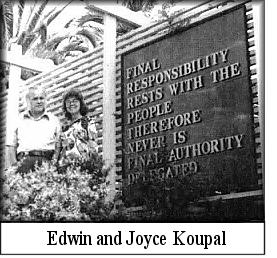Let me share my view of Ed and Joyce Koupal's significant role in the advancement of democracy in the United States. It is truly a human story of ordinary people doing the extraordinary. Such stories are the stuff of legends and myths that enrich our culture.
Ed and Joyce were awakened in the '60s to the fact that real political power rests with the people. They realized that the people, using their legislative power to enact laws by initiative, were the only power in or out of government that could satisfactorily address the truly fundamental issues.
 How and why they came to this realization is unknown to me. But I do know how unusual it is to hold such views in a political climate of citizen dependency sustained by the pervasive influence of the wholly-representative structure of government. In its current form, our government is designed to place political power in the hands of a small group of politicians. All that the people can do in such a structure is beg and hope that their representatives address their needs. For the Koupals to intuitively grasp the importance of human sovereignty and to act upon it is nearly unparalled in recorded history. Few scholars steeped in the workings of political science have yet to achieve the Koupals' inspired realization.
How and why they came to this realization is unknown to me. But I do know how unusual it is to hold such views in a political climate of citizen dependency sustained by the pervasive influence of the wholly-representative structure of government. In its current form, our government is designed to place political power in the hands of a small group of politicians. All that the people can do in such a structure is beg and hope that their representatives address their needs. For the Koupals to intuitively grasp the importance of human sovereignty and to act upon it is nearly unparalled in recorded history. Few scholars steeped in the workings of political science have yet to achieve the Koupals' inspired realization.
So equipped, the Koupals pursued a broad political agenda addressing social and environmental issues through numerous initiative campaigns. Their leadership served as a magnet for people of conscience and commitment. Under the Koupals' guidance, their colleagues and associates gained invaluable training and experience. The Koupals' contribution goes far beyond the enactment of laws-- they equipped and empowered an entire generation of activists for true democracy whose impact persists undiminished to this day.
I know first hand what the Koupals achieved in the nuclear power arena. I was the one who initiated the critique of nuclear power generation in the Congress between 1969 and 1974. Franklin Gage and I succeeded in getting Ralph Nader to enter the fray. Ralph then pressed the Koupals to undertake initiative campaigns across the West through which the people enacted laws that opposed the expansion of nuclear power generation. We won, but sadly, we now see the Bush administration revisiting this issue.
The Koupals' greatest contribution is directly linked to the enactment of the National Initiative for Democracy, which will empower Americans as lawmakers in every government jurisdiction of the United States. By 1975 Ed was beginning to formulate the need for a national initiative law. He conveyed his thoughts at length to his associates who were able to influence first the staff of Senator Abourezk and later the Senator himself. As a result of Ed's initial vision, Senators James Abourezk, Mark Hatfield, and I introduced Senate Joint Resolution 67 to establish a national initiative in 1977; a year after Ed had passed away. Senate Joint Resolution 67 is in reality Ed Koupal's legislation.
Senate Joint Resolution 67 never made it out of committee, but it did provide for an extensive Judiciary Committee hearing, which was the first opportunity to establish a formal record and a base of knowledge on this subject. In 1989-90, a decade after I left office, I was able to build on the Koupals' work to develop the initial draft of the National Initiative for Democracy.
To put the Koupals' role in proper perspective we must return to the birth of the Constitution and our government. In 1787, the Framers of our Constitution had no alternative but to design a representative structure for our government since the technology of the day did not allow for the assembling of the American people. Of course, that is no longer the case. Communication technology now easily permits the people to exercise First Principles*, which were last used to ratify the Constitution but which have, through a lack of use, become long forgotten. Recognition of First Principles shifts the balance of power from elected legislators back to the people, where it belongs. Ed and Joyce Koupal understood the full force and the need to exercise First Principles.
The legacy of the Koupals reawakened the use of initiative lawmaking in the 1960's and 1970's and extended the vision of its use nationally. This legacy takes its place in history with that of the Framers of our Constitution, the Dorrite revolutionaries of Rhode Island in the 1840's, the Populist and Progressive reformers who brought us the initiative lawmaking process in the first third of the 20th Century, and now with the National Initiative for Democracy, which seeks to institutionalize First Principles in American government.
Attaching the Koupals' name to the Democracy Symposium, which will trigger the national election to enact the National Initiative guarantees the recognition that their work deserves. It is a fitting tribute to the legacy of Edwin and Joyce Koupal.
For more information about the Koupal's role in creating a National Initiative, click here.
* First Principles is the sovereign authority and the legislative power of the people to create and alter governments, constitutions, and laws.

